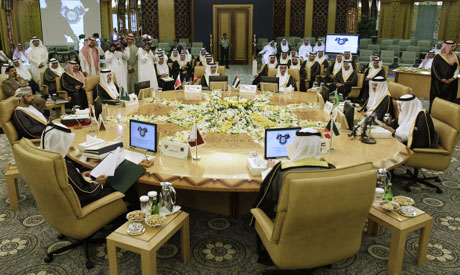
A meeting of members of the Gulf Cooperation Council (Photo: Reuters)
The Gulf Cooperation Council meets Tuesday for an annual summit freshly reconciled but facing a growing threat from Islamic extremism and falling prices of its main source of revenue -- oil.
Gathering in Qatar, whose support for the Muslim Brotherhood caused months of acrimony with fellow members Saudi Arabia, Bahrain and the United Arab Emirates, leaders from the six-nation GCC will seek to boost their influence in the wake of the Arab Spring.
They are also expected to act to defend their share of the international oil market amid a shale oil boom.
Security issues and inter-Arab relations are likely to dominate the Doha summit, especially with Egypt where the short-lived year-long reign of the Brotherhood was the spark for the worst diplomatic crisis to hit the GCC since its inception in 1981.
Riyadh, Manama and Abu Dhabi have now returned their ambassadors to Doha after withdrawing them in March over perceived Qatari meddling in their internal affairs because of its backing for the Brotherhood.
Qatar had been accused of destabilising the region by supporting the Brotherhood and giving refuge to opponents of its GCC partner states.
Analyst Abdelwahab Badrkhan believes the GCC reconciliation was motivated mainly by the threat posed by the rise of the Islamic State organisation in Syria and Iraq, which has prompted the Gulf monarchies to join a US-led campaign of air strikes targeting the group.
The monarchies "are concerned about their domestic security, which makes coordinating their security cooperation a must," he said.
One Gulf official told AFP the summit will see the formation of a "joint military command" to coordinate anti-IS military action with their partners.
Badrkhan said that having overcome their divisions on the Syrian crisis, and promoting a political solution there, "GCC divergences persist on relations with Egypt and the regional role of Iran", the Shiite powerhouse across the narrow Gulf.
The growing influence of the Islamic republic, main rival to Sunni Saudi Arabia, stirred regional tensions in the wake of the Arab Spring of 2011 and also as the United States and Iran began talks on Tehran's controversial nuclear activities.
GCC member Oman, which maintains good relations with Iran, acted out of step with its regional partners by hosting secret Iran-US discussions in 2011 and 2012, and mediating in crunch nuclear talks in November.
Another key issue for the summit is the plummeting price of oil, the driving force behind regional wealth.
A barrel of crude has lost 40 percent of its value since June, and prices continue to tumble since OPEC opted to maintain current production levels despite a market glut.
Oil has provided a bulwark of nearly two and a half trillion dollars in cash reserves, but for the Gulf monarchies "preserving market share has become more important than defending price levels", according to Kuwaiti expert Kamel al-Harmi.
*The story was edited by Ahram Online.
Short link: